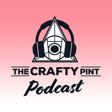
Sailors Grave: Building Dunetown, A Unique Brand & Community Connections
Chris and Gab Moore are the visionaries behind Sailors Grave Brewing, the East Gippsland brewery that's different in pretty much every way you can imagine: from the artwork designed by a British children's book illustrator and unusual ingredients to the amazing partnerships they've forged throughout their home region and further afield.
We invited them on to tell us about the impending arrival of Dunetown – the brewery and venue on their farmland near Cape Conran that will see them bring their original vision to life – as well as their pre-brewing life in Sydney hospo, their focus on sustainable practices and the importance of staying true to yourselves.
Before the chat with Chris and Gab, we outline our intentions for the weekly podcast and have a chat about some of the latest news from the Australian beer scene. Look out for a special guest who's very excited about the upcoming Blackman's Point Break Brewery Invitational too!
Links referenced in the show: Two-part mini-series on voluntary administrations: https://craftypint.com/news/3489/the-secret-brewer-voluntary-administration & https://craftypint.com/news/3490/the-secret-brewer-voluntary-administration-part-ii
Article on the state of play in beer, Shift Happens: https://craftypint.com/news/3500/2024-mid-year-report-shift-happens
Seeker's Tiny Tins: https://craftypint.com/news/3522/seeker-take-flight-with-tiny-tins
Holgate Brewhouse's People's Choice: https://craftypint.com/news/3521/vote-for-holgates-25-years-of-beers-peoples-choice
Sailors Grave Brewing: https://sailorsgravebrewing.com/ Point Break Brewery International: https://www.blackmansbrewery.com.au/point-break-brewery-invitational/
